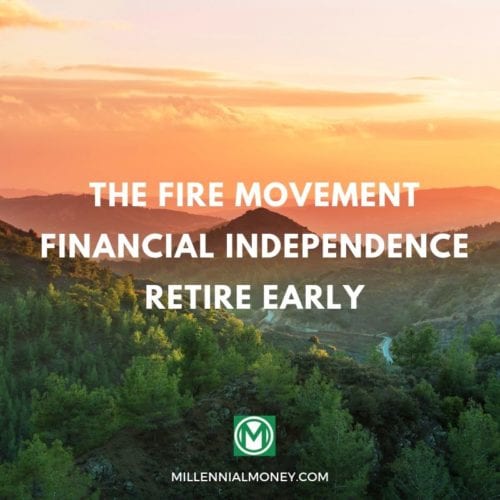The FIRE (Financial Independence Retire Early) Movement has exploded in the past year, gaining mainstream coverage, including a documentary, many new books, and a high-profile debate with old-school personal finance gurus.
But even though the “FIRE is spreading,” is it already dead? In this episode I go deep with one of my personal favorite FI bloggers, Bob Lai about his own journey, what the FIRE movement is missing, living a joyful life, and why happiness might not be the only logical pursuit. Check it out.
Financial Freedom Podcast Episode 13: Is FIRE Already Dead?
I am super stoked today to have Bob Lai, from Vancouver, Canada, on the Financial Freedom podcast. He is one of my favorite personal finance bloggers and is really popular in Canada. He wrote a post on the Financial Independence Retire Early (FIRE) movement, essentially proclaiming its death to some extent. I really loved the post, like I do all of Bob’s writing. I hadn’t had him on the podcast and wanted to chat with him.
Subscribe to the Financial Freedom Podcast
If you liked this episode and would like to subscribe to the Financial Freedom podcast you can pick your platform below. Also, if you enjoyed this episode reviews are greatly appreciated.
Episode Summary and Notes
Tell us a little bit about what inspired you to write the post FIRE. RIP.?

- It started off as a rant, but the more he wrote, the more he got into it.
- At the end of the post, he referenced a woman, Holly Butcher, who passed away at age 27. When he read her message, it connected with him.
- You see more FIRE coverage in the media, mostly on retiring early. Many of the articles focus on the wrong things. Most of the people they cover quit their jobs, but they are still working in some aspect. For example, bloggers may still be generating income from their blogs, like Mr. Money Mustache who has a popular blog and generates income from that and from being a carpenter. For him it isn’t work.
- Rather than focus on the retire early part, focus on the financial independence part. Try to improve yourself along the journey, because if you think FIRE is an end destination, that you will become happy when you get there, it is not going to happen for you. If you are not happy today, it doesn’t mean you will automatically become happy when you get there.
- We live in a world where we are taught to defer our dreams into the future and one day we will be able to do what we love. It is hard enough to plan for next year, how can you even begin to think of who you will be in 20 or 30 years from now.
- We live in a culture where it is so easy to chase money, and FIRE can be a money addiction in another form. Whether you are chasing money, status, or success, it is not that much different than spending all of your time optimizing your spreadsheets and penny-pinching. Life is more about balance and focusing on things that are outside of money.
- The FIRE movement has lost part of its soul. The FIRE community has gotten so focused on spreadsheets, withdrawal rates, numbers, and precision.
- Money is not going to make you happy. FIRE is not going to make you happy. You have to put life into perspective.
Can you talk a little bit about where your relationship with money comes from?
- Bob’s dad was an early retiree, who retired in his early 40’s. One of his cousins retired in his early 40’s and another in her late 40’s and continued working.
- It is not a taboo subject in his family. They can openly talk about what is a good investment and how much they are getting paid. When you have open discussions about money, there is quite a bit that can be learned.
- Bob didn’t have an allowance. His parents had money in a drawer, and if they needed any they could use it. Bob and his brother were taught to be responsible with money early on.
- Bob didn’t realize there was a FIRE movement until he started his blog. By having family members who retired early, he learned that FIRE is not the end goal, it is about focusing on life goals. What are you passionate about and what do you love to do?
- After high school or college, you are just focused on getting a good job. We are taught that if you go to school, get good grades, graduate, get a good job, work, and save, one day you will be able to retire. Many people are focused on FIRE, because they don’t like their jobs. If you work at a job you love, it doesn’t feel like a job.
- Bob is an immigrant from Taiwan and realized we need to focus more on the life aspect and try to improve your life. It is about self-improvement and what you can do better in your life everyday, and how you can be more content with yourself. How can you sit and meditate and be completely content with your life? Money is secondary.
- The tag line for Bob’s blog is “A Taiwanese Canadian’s quest for joyful life & financial independence”.
- To be human is to grow. When we stop pushing ourselves we are the least happy.
- Financial independence is a personal journey. At the end of the day, you are going to get closer to financial independence if you can stop and ask yourself:
- “What kind of life do I actually want to live?”, and
- “How much money does it take to do that?”
- What works for someone else may not work for you. It is such a personal subject and you can’t just compare two people. If you can save 15 percent this year and then next year you can save 16 percent, that is pretty incredible. Don’t throw yourself under a bridge because you are saving 15 percent and someone else is saving 50 percent. If you have a single-income family versus a double-income family, your savings rates are going to be different.
- Bob likes that the FIRE community is so supportive. It is not a competition, it is just trying to help each other get where they want to go. What is the point of expediting your FIRE journey if you are not happy and not focusing on your life.
- You need to find your own personal balance between saving for the future and spending for today. You can’t do one extreme. It is not healthy. You need to find what works for you.
- Someone posted Bob’s article on Reddit, and people were saying that he gave up on FIRE, because they didn’t read it.
- Retirement is optional. If you reach FIRE, you can still do something. Humans are meant to work and strive.
- In the U.S., the average savings rate is 2.9 percent and the average American has less than $1,000 saved. The keyword “millionaire” gets people to click the link and hopefully they read it and see the fundamentals. The articles about people becoming millionaires by age 30 catches their attention, but people have such short attention spans these days.
- People naturally gravitate toward reading things that support their own worldview, instead of opening their worldview.
- Realize that you are enough, no matter how much money you have. Figure out your purpose in life – is it to work in a job you don’t like for 20 or 30 years, or is it to help other people. FIRE is a way to allow you to realize your purpose in life. It is just a stepping stone. FIRE is only 20 percent of the pie, your life is the other 80 percent.
- When you are gone from earth, how are you going to be remembered?
- Grant wanted to be FI so he could escape, and he got addicted to saving money. Going through the process was transformative. Once he got to FI, his brain opened up and he wanted to help others and spend more time on his relationships.
- When you reach FI, you get to a point where you are forced to confront yourself. Hopefully, FI opens up things that make you happy, but it can make you feel empty too, if you don’t have something to strive for.
- Part of the FI journey is about simplifying your life by going away from a consuming mentality to asking “does it make sense to consume this?”.
- After Bob read Cait Flanders’ book The Year of Less, he realized it is not just about consuming things, it is also about consuming food, beef, alcohol, etc. Are there choices we can make today to lessen the environmental impact later. If you go to a poor country, you will often find that the people are extremely happy. It is about finding contentment. The irony is that this is difficult to realize, until you have enough money.
- Social media is creating more wants, but you don’t know how that person is living. They could be going on expensive vacations and eating at nice restaurants, but they could be up to their eyeballs in debt.
- Studies show that kids don’t feel like they actually have a real experience, unless they experience it through social media. The reflection of yourself has to validate yourself.
- Financial freedom is all about you, and you need to be honest about the life you want to live. We unconsciously compare ourselves to others, and we need to consciously override that and be grateful for how much we have. If you make $32,000 or more, you are in the top one percent in the world.
Do you have any closing thoughts?
- There is nothing wrong with the FIRE movement, but we should focus more on financial independence instead of retire early. Maybe it should be changed to financial independence retire elective instead.
- FIRE is just a small aspect of your life and instead of focusing on the spreadsheets, numbers, and withdrawal rates, focus on improving your life, relationships with others, and finding what you truly love and what you could do. Maybe it could generate money.
- When you wake up and are excited about what you are doing, you don’t think about the money as much. If you can get to that point, you no longer want to escape.
- How can we collectively help others and improve the world we live in today? There are so many people that are just scraping by. How can we help them? Little things add up. How can we make choices in our lives to help the environment? If we keep polluting the earth, the human race will eventually end.









Read 1 comment or add your own
Read Comments